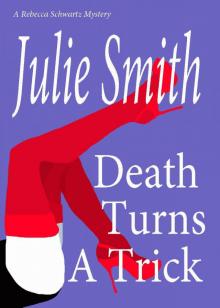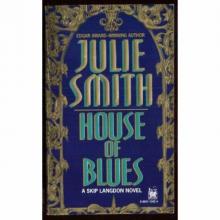- Home
- Julie Smith
Crescent City Connection (Skip Langdon Mystery #7) (The Skip Langdon Series) Page 2
Crescent City Connection (Skip Langdon Mystery #7) (The Skip Langdon Series) Read online
Page 2
“We’re here to serve.”
“How about you go be a cop for a while.”
“Uh-uh. I’d rather watch you suffer.” He was a filmmaker who’d become a film editor but never got over his first love. Right now he was back in New Orleans working on what was getting to be a long-term project: a documentary about kids who’d been shot—and, as Skip liked to say, the kids who shot them.
“You came to the right place. I’ve had a hell of a day.”
“Can you tell me about it?”
Sometimes she couldn’t, but this was different.
“Why not? It’ll be on page one tomorrow.”
When she had finished, he looked worried. “You … uh … dealing with this okay?”
“You sound like Cappello.” There was a reason for it. She’d had a near breakdown after shooting the man who tried to kill her.
She patted Steve’s knee, trying to reassure him. “Yeah, I’m dealing with it fine. Except, of course, for the part about the grandma. That gets to me.”
“Do you ever think about Shavonne?” Shavonne was the little girl who’d watched Skip blow her daddy away.
“Oh, yeah. I don’t even want to stop thinking about her—I don’t think it’d be right to forget. I mean, I don’t dream now—don’t look so worried—but I try to keep tabs on her. I check up on her now and then, sometimes even …” she hesitated.
“What?”
“You’re gonna think I’m crazy.”
“Tell me.”
“Oh, well. If you’re here long enough you’ll find out anyway. I take her little presents sometimes. Little surprises—anonymously, of course.”
“You’re right. I think you’re crazy.”
Skip felt her face get hot. She said nothing.
“But crazy good, of course. Crazy in a very sweet way.”
“You really think it’s nuts?”
“Of course not. No. You’ve got two really great projects— Shavonne and Jacomine. They balance out perfectly. Skip Langdon, Batwoman—flap one wing and nurture the innocent; flap the other, destroy all evil. You gotta love it.”
Her cheeks warmed again. “It’s not like that.”
“Don’t get huffy.”
“Are you laughing about Jacomine? Do I actually hear you laughing about him? The kids could be in danger.” She meant her friend Jimmy Dee’s adopted children—Napoleon’s pal Kenny and Kenny’s sister, Sheila. Jacomine was someone with whom she had some history. He was crazy, he was evil, and he had reason to hate her. She could never shake the fear that he’d go after the children—or even Steve or Jimmy Dee if he couldn’t get the kids. But there was no doubt in her mind, he’d try first for the children—it was meaner, it was nastier, and it was more likely to send her around the bend.
She said, “Let’s go watch the news. Cappello’s probably afraid they’re going to crucify LaSalle.”
But LaSalle’s case rated only a sentence or two—there were a couple of giant stories pushing everything else to the back, one national, one local.
The local one was huge—a blockbuster, said the anchorman—so mind-boggling no one would believe it. But first, a bigger one.
It was the verdict in the Billy Ray Hutchison case, a murder trial the press was calling “O.J. Revisited.” The thing was eerie, it was so similar to the O.J. Simpson trial: Billy Hutchison, an African American football player who did commercials, was accused of killing a wife who claimed a history of abuse.
But there were two major differences in the cases—the two were still married, and the wife was also black. To Skip, the evidence seemed overwhelming, and, to her mind, there wasn’t a racial issue.
Open-and-shut, she would have said.
But because of the Simpson trial—and because of Hutchison’s huge popularity—all eyes were on it.
The verdict was “not guilty.”
“Shit. He did it.”
Steve said, “FemiNazi.”
Skip made her hands into claws, pretending to scratch his eyes out. “It’s not funny. He bought himself a walk.”
“Get used to it. It’s the American way.”
“Oh, hell. I wish I had a joint.”
“Thought you stopped that shit.”
“God, I’m in a mood.”
“I don’t see why you’re so surprised. He’s not the kind of guy who’d do a thing like that.”
For the first time, she really looked at him, suddenly not sure what he was saying. “You’re kidding, right?”
“I’m just a right-thinking American—the bitch had it coming. Probably gave him lip every time he brought home a bimbo.”
Okay, he was kidding. “You’re not helping my mood.”
“Hey, who cares about evidence? I need justice—I work all day and when I come home I want a hot meal on the table. What do I get? Lip, lip, and lip. Billy’s my man.”
“I see what you’re saying, but there were eight women on that jury.”
“He’s a good-looking dude. That goes a long way in this country—along with a few million green ones.”
“I hate lawyers.”
“Omigod. Listen.”
The local story was on. Sometime between now and the time Skip left headquarters, the superintendent of police had resigned.
She said, “Holy shit! I should have called Cappello. Did I hear that right?”
“Even I don’t believe that one.”
“They said it though, right? Pinch me.”
“They’ll probably replace him with somebody worse.”
“There isn’t anyone worse. This dude’s dumb as a rock and corrupt as hell. God, is he stupid! Every day he transfers somebody just for the hell of it—just to prove he can do it, I guess.”
“Do you think he’s resigning over this LaSalle thing?”
“Naah. I bet it’s been in the works for weeks. Even the mayor can’t stomach him—or more likely, can’t stomach the increasing outcries of an angry populace. If he’s smart, he’ll bring in someone from outside.”
“The problem is, he’s not smart.”
“Well, he may be desperate.”
“I know I am.”
“Well. Mr. Cynical finally comes clean.”
He shrugged. “You gotta keep your sense of humor. Either that or go nuts.”
“You know what? This is good news. We just heard good news on the boob tube. Mark down the date and time. Break out the champagne.”
Two
DORISE WAS WASHING wineglasses in a great big old stainless steel double sink equipped with garbage disposal. She was in pig heaven.
“Dorise! That’s lovely, but—”
Cammie Fontenelle had clicked into the kitchen on shoes so tiny Dorise wondered if she had to special-order them. In fact, Cammie was so petite she probably had to get her clothes somewhere in Asia. At the moment she was wearing a flamingo-pink spring suit that nipped in to show a waist about the size of a hummingbird’s. Dorise liked her as well as it was possible to like someone from another planet.
Cammie’s pretty little face was screwed up in distress, blue eyes all squinty. She didn’t know how to ask for what she wanted.
What was Dorise doing wrong?
Singing. She hadn’t even noticed.
“Oh, darlin’. I’m so sorry. I didn’t even know I was doing it.”
Cammie smiled, all better again. Her eyes were sparkly between their liner and their shadow. “It’s beautiful. Really. Maybe you should come out and entertain.”
Dorise waved a hand at her and smiled. She started humming again before she caught herself. All things considered, she’d rather be in the kitchen, washing Cammie’s antique crystal, lovingly handling the gorgeous glasses, loading the china in the dishwasher, getting a gander at the silver as she put things back in the kitchen cabinets.
She liked serving, too, standing at the buffet table, ladling out the crawfish pasta and grilled vegetables, checking out the ladies’ sleek bright suits. Cammie always requested her, and now so did lots of
Cammie’s friends, who also had occasion to give luncheons from time to time. She was careful, she was thorough, she was fast, and she was cheerful—those were some of the things that had consistently been mentioned in her evaluations ever since she went to work for Uptown Caterers. Her mama had taught her right.
It was easy to be nice in houses that were cool in the summer and warm in the winter, where you walked on Oriental carpets nearly as old as the houses themselves. Another lady, one the next generation up from Cammie, had explained to her that the more threadbare and tattered the rugs looked, the more likely they were to be valuable, thus the more careful she had to be.
In these houses, upholstery was always some kind of soft stuff, like silk or velvet. The furniture was dark and shiny, crystal prisms rained from sconces, mirrors were framed with gold leaf, metallic-colored tassels tied the curtains. There was so much to look at, she could hardly work.
She didn’t exactly fantasize about living in these places. That made no more sense to her than taking up residence in a museum—and anyway, she had an eight-year-old daughter. How did you keep a kid from breaking the Chinese vases? How did you get comfortable in a place like this? How did you keep it clean?
And then, of course, there was the problem of keeping the neighbors from shooting you. (Or more likely, shooting your brother or husband. Black men were viewed with suspicion in the Garden District. But she didn’t think much about that—her own living room in the East hadn’t been all that healthy for her late husband.) These places were just foreign—great huge rooms and high ceilings, more than a hundred years old. But she loved being in them, looking at everything, taking care of things. And the people who came to lunch! Judges’ wives, doctors’ wives, legislators’ wives, and for the night parties, the judges and doctors, too, some of them women. Some of them black. At Cammie’s once, she had met Suzanne Nickerson, the most popular anchor-person in the city. A black woman.
“I felt like I was really hangin’ out with the stars,” she told her sister.
Her sister had said, “Dorise, don’t you get it? You aren’t hangin’ out with anybody. You the help.”
“You just jealous,” she had said. “How else you gon’ meet Suzanne Nickerson?” Her sister worked at a laundry, back in their old neighborhood.
Under questioning, even her sister would have said Dorise was doing good. Dorise knew she was. She’d gotten married young and had some piddly job at a video store until her husband insisted she quit working. He made plenty of money and she had a kid to take care of.
She didn’t ask him how he got his money—he was a businessman with lots of investments. She didn’t know he had his own apartment somewhere else and a life she knew nothing about, until the day he died. Leaving her with nothing. Leaving their daughter with nothing.
“Why didn’t you know, Dorise?” her mother had asked. Her sister had asked. Everyone had asked.
But they hadn’t known either. “Not for sure,” they said. It wasn’t polite to bring it up. Dorise came from a churchgoing family, and the day Delavon came into the video store with his fancy clothes and his fancy car and his silver tongue, he told Dorise he managed a band she’d heard of, everybody’d heard of. Later, when she asked why he never took her to concerts, he said he quit that job to “take care of some other bi’ness,” and she believed him. He bought her a nice little house, or so she thought. After he died, it turned out they didn’t really own it.
Dorise was strong, though. She picked up and moved to Gentilly, taking Shavonne with her. She kept applying for jobs until she got one, and because she was such a hard worker, she did well. “Just be nice,” her mother said, “and people’ll be nice to you.”
Her sister said being nice to white people was bullshit, but Dorise enjoyed it. “Law, girl,” her mother said. “You always had a good disposition. Miss Sunny Smile, yo’ daddy used to call you.”
She did have a pretty smile, to this day. She had a big butt and big hips, and she sort of floated when she walked. Her husband had picked on her, told her she’d gotten fat and he didn’t want to “have nothin’ to do with her no more,” by which he meant sex (though what he did and what he said were two different things). But other people liked her. “You look like a nice person,” the older lady had said, the one who told her about rugs.
“I try to be,” she answered, and the woman smiled back. That was all there was to it—that and being careful, respecting other people’s things. She was doing so good she almost didn’t believe it sometimes.
She had a little apartment, and enough money to buy clothes for herself and her daughter, and her mother had given her her old Chevy. Half the women she knew—other single mothers— didn’t even have cars.
She didn’t need all those presents her husband used to bring her—stereo systems and bracelets and things. A good thing, too, because she’d had to sell themall. There was no one to be home for anymore. And Dorise liked working. She liked the people she worked with and she liked meeting the clients.
What she missed was having a man.
Sometimes she missed her husband, even though he had an evil mouth on him and knew how to hurt her feelings. But when they made love, there was nobody better, nothing sweeter.
“Mmmm-mmmm,” she told her sister. “Chile, I tell you.”
Lawrence came in to pick up the equipment. “Just about over?”
“Seem like it. Few people still drinkin’ coffee.”
“This some place, huh? How you like to live here?”
“Would you like to? Tell me the truth.”
“You kiddin’? I got three kids and four rooms—now what you think?”
“But I mean here. With all this stuff in it—seem like home to you?”
He laughed. “Well, I sho’ wish it did.”
“I rather have a nice place out in the East.”
“Well, I could see that, but in a pinch.”
They both laughed. “Okay. In a pinch.”
Cammie clicked back into the kitchen. “Hey, Lawrence. Y’all hungry?”
Dorise appreciated the way she always asked. She and Lawrence shook their heads. Dorise said, “I’m tryin’ to lose a little weight.”
Cammie looked at her watch. “Don’t you have to pick up your little girl?”
She nodded. “Just soon’s I finish here.”
“Well, go ahead. I can do the rest of those.”
Dorise thought Cammie one of the most considerate of the women she worked for, but Lawrence said, “She just don’ want to pay for another hour.”
She rattled off in her old Chevy, arriving five minutes before school let out. Once she had been twenty minutes late, and her daughter had stood alone in front of the school in the rain, hair soaked, clothes plastered to her body, tears streaming down her face.
But Shavonne had lied to make her feel better: “These ain’ tears, Mama. They just raindrops.”
That was worse than if she’d stamped her foot and sassed. Now they had a deal: If Dorise wasn’t there as soon as school let out, Shavonne went home with her friend Chantelle.
Today she came running out in jeans and a turquoise T-shirt, hair neatly braided and held by clips. She was such a tiny thing!
Since Dorise had gained weight—shortly after Shavonne’s birth—the idea of unpadded bones was inconceivable to her. Her own mama was heavy and so was her sister. Yet they had all been skinny little kids once.
She could barely remember her own thin body or her childhood. Even Delavon’s memory was fading. Dorise prided herself on living in the present.
“How was school?”
“Good. You know about Passover?”
“Somethin’ in the Bible.”
“They still have it, Mama. Lady come in and tell us all about it.”
“Well, ain’t that nice.”
“Some days be better than other days.” Dorise didn’t know if she meant school or her own state of mind. Shavonne had watched her father die, shot to death in their living room.
Dorise said, “Honey, you still dreamin’?”
Slowly, reluctantly, Shavonne nodded, but half-heartedly, only a couple of times.
“You don’t call me no more.” At first her daughter had screamed out in the night, terrified, desperate to be reassured.
“Ain’t no point, Mama. I know it’s a dream. Ain’t nothing you can do.” She was looking at her lap.
Dorise said nothing, wondering what all this meant. It could mean her daughter was growing up a little, getting over what had happened. But something about the way Shavonne spoke sounded so calm, so resigned, it worried her. She wasn’t sure why, but it gave her the creeps.
She said, “Now don’t you be like that. Mama be right there. Right in a minute. Promise me now.”
“Okay.” But she didn’t raise her eyes. She was such a good girl. Some things just weren’t fair.
“Tell you what. Maybe Chantelle like to come over. You like that, precious?”
The way Shavonne nodded was much like she had before, when Dorise asked her if she still dreamed—slow and not very convincing.
“What’s the matter, baby?”
“Nothin’, Mama.”
Chantelle’s mama said why didn’t Shavonne come over there, spend the night even, give Dorise a night off? And Shavonne seemed to like that idea—but Dorise had a hard time reading her these days.
The upshot was, Dorise found herself home alone, something that hadn’t occurred since before Shavonne was born, maybe. Nobody was there—not her sister, not anybody. She could take a nap if she wanted.
But Dorise wasn’t the napping kind. I could make gumbo, she thought. Then we’d have some for the weekend.
I could call Troy.
Troy was a man she’d met at her sister’s house, a neighbor, with whom she’d had a date or two. There was something about him she liked.
Yeah, said her sister. Somethin’ hang down between his legs.
Dorise said, “How I know about that? I ain’t even seen what he got down there.”
She thought, I might like to, though, and the thought scared her a little bit. She hadn’t been to bed with anyone but Delavon in ten years.
I need to get to know him better.

 Death Before Facebook (Skip Langdon #4) (Skip Langdon Mystery) (The Skip Langdon Series)
Death Before Facebook (Skip Langdon #4) (Skip Langdon Mystery) (The Skip Langdon Series) P.I. On A Hot Tin Roof
P.I. On A Hot Tin Roof Death Turns A Trick (Rebecca Schwartz #1) (A Rebecca Schwartz Mystery) (The Rebecca Schwartz Series)
Death Turns A Trick (Rebecca Schwartz #1) (A Rebecca Schwartz Mystery) (The Rebecca Schwartz Series) The Axeman's Jazz (Skip Langdon Mystery Series #2) (The Skip Langdon Series)
The Axeman's Jazz (Skip Langdon Mystery Series #2) (The Skip Langdon Series) The Kindness of Strangers (Skip Langdon Mystery #6) (The Skip Langdon Series)
The Kindness of Strangers (Skip Langdon Mystery #6) (The Skip Langdon Series) Louisiana Hotshot
Louisiana Hotshot House of Blues
House of Blues Jazz Funeral (Skip Langdon #3) (Skip Langdon Mystery) (The Skip Langdon Series)
Jazz Funeral (Skip Langdon #3) (Skip Langdon Mystery) (The Skip Langdon Series) Tourist Trap (Rebecca Schwartz #3) (A Rebecca Schwartz Mystery) (The Rebecca Schwartz Series)
Tourist Trap (Rebecca Schwartz #3) (A Rebecca Schwartz Mystery) (The Rebecca Schwartz Series) Louisiana Bigshot
Louisiana Bigshot Huckleberry Fiend
Huckleberry Fiend Louisiana Lament
Louisiana Lament Crescent City Connection (Skip Langdon Mystery #7) (The Skip Langdon Series)
Crescent City Connection (Skip Langdon Mystery #7) (The Skip Langdon Series) Dead In The Water (Rebecca Schwartz Mystery #4) (The Rebecca Schwartz Series)
Dead In The Water (Rebecca Schwartz Mystery #4) (The Rebecca Schwartz Series) True-Life Adventure
True-Life Adventure New Orleans Noir
New Orleans Noir